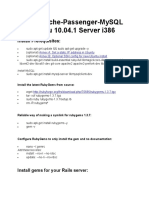0% found this document useful (0 votes)
120 views53 pagesDeveloping A Friendly Openresty Application
This document discusses developing a user-friendly OpenResty application. It notes that most OpenResty applications are private and deployed internally. It suggests ways to make an OpenResty application easier to install and deploy, such as only using NGINX processes, minimal library dependencies, horizontal scalability, and platform agnosticism. It provides an example comparing using cronjobs versus the ngx.timer API for recurring background jobs. It also introduces Kong, an open source API gateway built with OpenResty, and discusses how Kong has improved over time to reduce dependencies and fragmentation.
Uploaded by
massonCopyright
© © All Rights Reserved
We take content rights seriously. If you suspect this is your content, claim it here.
Available Formats
Download as PDF, TXT or read online on Scribd
0% found this document useful (0 votes)
120 views53 pagesDeveloping A Friendly Openresty Application
This document discusses developing a user-friendly OpenResty application. It notes that most OpenResty applications are private and deployed internally. It suggests ways to make an OpenResty application easier to install and deploy, such as only using NGINX processes, minimal library dependencies, horizontal scalability, and platform agnosticism. It provides an example comparing using cronjobs versus the ngx.timer API for recurring background jobs. It also introduces Kong, an open source API gateway built with OpenResty, and discusses how Kong has improved over time to reduce dependencies and fragmentation.
Uploaded by
massonCopyright
© © All Rights Reserved
We take content rights seriously. If you suspect this is your content, claim it here.
Available Formats
Download as PDF, TXT or read online on Scribd
/ 53




















































































